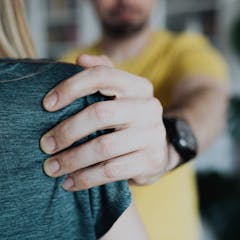
Articles on Family violence
Displaying 21 - 40 of 174 articles

We should celebrate that this bill is passing through parliament. But there are 2 key concerns.

Safe Home attests to the ways violence is insidious and ingrained in systemic structures of power.

The new Personal Safety Survey shows eight million Australians have experienced some form of violence since the age of 15, but women are far more likely to be victims than men.

Experience of any form of partner violence increases the risk of developing chronic illnesses. Healthcare professionals need to recognise family abuse as a health issue.

All brothers and sisters have tensions or disagreements from time to time as they jockey for position in the family. But when one sibling victimizes another, there can be serious and ongoing harms.

The media needs to take greater care when covering these cases, as the reasons behind such violence are incredibly complex.

The State of Knowledge Report on Violence Perpetration, released today, reviews the current data and research on who perpetrates domestic, family, and sexual violence.

Our research found missed opportunities are evident in child protection, health settings, mental health settings, drug and alcohol interventions, and in corrections.

Many have looked to Victoria to gauge what a multi-billion-dollar government commitment to family violence reform can deliver.

The threat of fire and burning as a tool of family violence isn’t routinely assessed and addressed in Australia.

Health and service workers are not asking women about a potential traumatic brain injury, there’s a lack of referral options, and often no diagnosis.

For years, we’ve taken major sporting events, a public holiday, added alcohol and gambling, then watched domestic violence rates rise. It’s time we did something different.

The ten-year National Plan to End Violence Against Women and Children is proposing to align with Closing the Gap to address First Nations violence. This could work, but there are limitations.

We need not just an acknowledgement of children as victim-survivors in their own right but a commitment to boost resourcing of child-centred recovery support.

A new ten-year plan to end violence against women and children has some significant strengths, but it also has some deficits, and details are still to be released.

Young women lack voice and visibility in discussions about family violence in Australia, and particularly intimate partner violence. This must change, urgently.

After separation, mothers who experienced domestic violence on average suffered a drop in income of 34%, compared with a 20% decrease for mothers who didn’t experience domestic violence.

Young people who experienced violence between other family members, and had been directly subjected to abuse, were 9.2 times more likely to use violence in the home.

As well as abuse, many Australian have also experienced threats of harm and harassing behaviour.

In Australia, the discussion around gendered violence is increasingly focused on diversity. However, policy and services continue to be based mostly on the experiences of white, Anglo-settler women.





